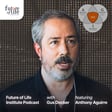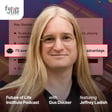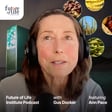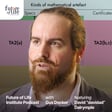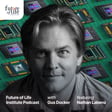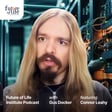Become a Creator today!Start creating today - Share your story with the world!
Start for free
00:00:00
00:00:01

Anthony Aguirre and Anna Yelizarova on FLI's Worldbuilding Contest
Anthony Aguirre and Anna Yelizarova join us to discuss FLI's new Worldbuilding Contest.
Topics discussed in this episode include:
-Motivations behind the contest
-The importance of worldbuilding
-The rules of the contest
-What a submission consists of
-Due date and prizes
Learn more about the contest here: https://worldbuild.ai/
Join the discord: https://discord.com/invite/njZyTJpwMz
You can find the page for the podcast here: https://futureoflife.org/2022/02/08/anthony-aguirre-and-anna-yelizarova-on-flis-worldbuilding-contest/
Watch the video version of this episode here: https://www.youtube.com/watch?v=WZBXSiyienI
Follow Lucas on Twitter here: twitter.com/lucasfmperry
Have any feedback about the podcast? You can share your thoughts here:
www.surveymonkey.com/r/DRBFZCT
Timestamps:
0:00 Intro
2:30 What is "worldbuilding" and FLI's Worldbuilding Contest?
6:32 Why do worldbuilding for 2045?
7:22 Why is it important to practice worldbuilding?
13:50 What are the rules of the contest?
19:53 What does a submission consist of?
22:16 Due dates and prizes?
25:58 Final thoughts and how the contest contributes to creating beneficial futures
This podcast is possible because of the support of listeners like you. If you found this conversation to be meaningful or valuable, consider supporting it directly by donating at futureoflife.org/donate. Contributions like yours make these conversations possible.
Transcript
Introduction and Guests
00:00:03
Speaker
Welcome to the Future of Life Institute podcast. I'm Lucas Perry.
FLI World Building Contest Overview
00:00:08
Speaker
Today's episode is with FLI team members, Anthony Aguirre and Anna Gala-Zorova, and is meant to provide information about the FLI world building contest. In short, this is a contest which invites teams from across the globe to compete for a prize purse of up to $100,000 by designing visions of a plausible and aspirational future that includes strong artificial intelligence.
Host Transition and FLI Job Opportunities
00:00:32
Speaker
If you want to know more about this competition and how to get involved, you can listen to this podcast or head over to worldbuild.ai for more information. Before we jump into the interview, and in case you didn't catch it in the David Chalmers episode, I'll be moving on from my role as host of the FLI podcast. And this means two things.
00:00:53
Speaker
The first is that FLI is hiring for a new host for the podcast. As host, you would be responsible for the guest selection, interviews, production and publication of the FLI podcast. If you're interested in applying for this position, you can head over to the careers tab at futureoflife.org for more information.
00:01:12
Speaker
We also have another four job openings currently for a human resources manager, an editorial manager, an EU policy analyst, and an operations specialist.
Lucas Perry's New Podcast Plans
00:01:23
Speaker
You can learn more about those at the careers tab as well. The second item is that even though I'll no longer be the host of the FLI podcast, I won't be disappearing from the podcasting space.
00:01:35
Speaker
I'm starting a brand new podcast focused on exploring questions around wisdom, philosophy, science, and technology, where you'll see some of the same themes we explore here, like existential risk and AI alignment. I'll have more details about my new podcast soon.
Explaining World Building
00:01:53
Speaker
If you'd like to stay up to date, you can follow me on Twitter at Lucas FM Perry, link in the description.
00:02:00
Speaker
And with that, I'm happy to introduce Anthony Aguirre and Anna Jelzerova on FLi's new world-building contest.
00:02:13
Speaker
Welcome to the podcast, Anna and Anthony. It's great to have you. Today we're here to talk about FLI's new world building contest, which is quite a new, exciting initiative that you guys have both put a ton of time into working on. So I have a two part question to start things off here. The first is what is world building? And the second is what is FLI's world building contest?
00:02:37
Speaker
When I start out with world building itself, so world building is the process of kind of constructing a fictitious world in which a story or a movie or a novel or something takes place.
00:02:52
Speaker
If you think about, for example, Star Wars, there's the Star Wars movies, and then there's the Star Wars world that they inhabit. It has certain rules, like there's the force, you know, there are spaceships, faster than light travel is pretty easy. A.I. is apparently really hard because there's only like human level robots.
00:03:11
Speaker
There are different politics that are happening in the galaxy. There's a certain level of span of technologies. So there are all these kind of rules to the world. And then within that set of rules, there are a lot of different artifacts. So there's Tatooine, you know, the desert planet, and it's got its own whole feel and its politics and sociology and things. And then there are other planets and then there's the shape of the star destroyer. So there are all these things that have been constructed creatively to inhabit that
00:03:39
Speaker
World that is governed by some set of rules so world building is the process of constructing that fictitious reality including all the details of you know how the politics work what is the technology what is in it what sorts of people are in it what is the history you know what has happened in the past and so on.
World Building as a Profession
00:03:59
Speaker
And the idea is to give you a backdrop for really imagining that you're in this world. So a really good world bill is kind of this evocative thing where you feel like, ah, I could be in that. It's something that I can sort of experience in my mind. And that gives you the feeling of reality because it has been thought through in this self-consistent way. You kind of understand what the rules are. You'd be surprised if certain things happen in Star Wars that are coming from Star Trek or vice versa. Those are different worlds that have different sets of rules in them.
00:04:27
Speaker
So this is a process that's been developed both kind of informally, you know, anybody who's writing, say, a science fiction novel or a fantasy novel or something has some world building element to it because there's this, you know, an imagined world in which the story is taking place.
Contest Goals and Structure
00:04:43
Speaker
but it's also been sort of developed more professionally. So there's a whole industry, say in Hollywood, of constructing the world that, you know, the Marvel universe or that Star Wars or that Star Trek inhabits. So there are people who are actually doing this for a living, building fictitious worlds and inventing the artifacts that earn those worlds. And there are world building programs, you know, university programs that you can learn how to do this process. So it's a minor industry, but an important one because it's in a lot of our media.
00:05:10
Speaker
The idea of this contest is to sort of re-task this way of thinking about things of constructing fictitious worlds to try to construct some plausible and aspirational versions of our own actual world.
00:05:26
Speaker
not necessarily for some other purpose to put a story into, but to investigate those worlds on their own and to enjoy the process of making them and think about what goes into making that world and then kind of explore the variety of different worlds that people come up with.
00:05:42
Speaker
So the idea of the FLI world building contest is to create a competition where the goal is to, as teams, invent a sort of fictitious world that exists in 2045. It's a world that should make sense, be internally consistent, follow the laws of physics, have plausible technology for 2045, and we'll get to some of those ground rules. But very importantly, it's also supposed to be aspirational. So it's supposed to be a world that we would like
Benefits of World Building
00:06:12
Speaker
to inhabit.
00:06:12
Speaker
We'll talk a little bit about why we chose to do it that way instead of just any old world in any old time and so on, but the idea is to gather up lots of interesting contributions from teams around the world and incentivize them with this contest with a nice juicy prize purse to get people really working hard and putting effort into this world build. Why is it important to do world building for 2045?
00:06:36
Speaker
I think the year 2045 is interesting because it's still in the somewhat near future where most of us would still be alive. So it's very easy to imagine as opposed to a very distant world, you know, where you can reimagine almost everything here. We're trying to keep a lot of what we know what exists today, but then with a set of constraints.
00:07:00
Speaker
Help us do this thought experiment about how we managed to overcome certain challenges that we already see on the horizon. So the idea of world building for 2045 is just a constraint to focus this exercise, but we might do a different world build that's in a more distant future. But for now, this is to focus ourselves.
00:07:22
Speaker
Given humanity's track record of ramrodding our way into new technologies and worlds just following kind of like natural economic incentives, why is it important that we have a world building contest, that we practice world building? So I think both as individuals and as a society we're
00:07:40
Speaker
fairly goal directed in general. We have goals for our personal life on a day-to-day basis. On a longer time scale, we have goals to have a good career, to be happy in this way and that, to have a good relationship, maybe to have kids, maybe for them to have good things happen to them. So we have these long-term goals and we work toward them.
00:07:59
Speaker
If we didn't have those goals, if we just every day sort of woke up and sort of went through some random set of motions, that would be an okay way to live, but we would have a very different life than if we had some choices about what were more and less desirable for our life and aim toward them.
00:08:15
Speaker
And I think as a society, we can do much the same thing. We can have some level of goals as a society and work toward them. I think often we have done that less lately in society than we perhaps did in the past. I think there is a sense
00:08:34
Speaker
that there's progress, but it's mostly technological progress, and it's maybe a little bit of social progress, but it's kind of just pushing us along, and we're just going where the techno-social progress takes us. And there's not really much we can do about that. There's kind of capitalism, and there's technology, and wherever they go, we just have to ride it out as best we can.
00:08:54
Speaker
And I think this is a very disempowered way to look at the world. You know, we as a society, just like as individuals, have a lot of agency as to what happens to us. We make decisions and those decisions have real consequence. And part of the idea of this contest is to do a little bit more thinking about what are some possible goals.
00:09:13
Speaker
You know, if we think about the world 25 years from now, if we imagine a world that we actually want to inhabit, we're not going to end up living in that world. The world is too unpredictable and things are not going to go the way that we want, just like regular life. But if you don't have any goal at all, it's very hard to know what to work toward and what to do now in order to get there. So the idea here is to kickstart a process of thinking through what would we like the future to look like?
00:09:40
Speaker
not just vaguely like we haven't destroyed the world through global warming or through AI catastrophe or through biotech catastrophe. Like that's good. That's important. We really definitely want to not destroy the world, but going a little bit beyond that, what do we actually want it to look like? And are there things that we can do now to start to plant the seeds for that kind of world?
00:10:02
Speaker
And you can't plant the seeds now if you don't really know what kind of world you want to grow into. So the goal of this is to sort of plant some posts down the line two decades from now of, wow, wouldn't it be cool if the world was like this? Here's what would have to happen between now and then if the world was going to be something like that. And again,
00:10:23
Speaker
That probably will go astray. It's not going to end up quite the way you want it to, but I think just as in your individual life, pushing in a more positive direction and having a goal doesn't guarantee that you're going to reach it, but is probably a more positive and you're going to get closer to that goal than if you don't have a goal at all or if you have some radically different goal. The idea here is to start that process.
00:10:46
Speaker
to engage a lot of the creativity that has gone into imagining negative worlds.
Challenges and Aspirations in World Building
00:10:52
Speaker
So there's a lot of effort that has gone into imagining dystopias and just various ways that the world can go off the rails. I think this is good. I think as individuals, we also imagine all the things that can go wrong. As a parent, you think of every possible thing that can go wrong with your kids. Still, they find more.
00:11:13
Speaker
And that's good because that's how you protect your kids from getting run over by a car, eaten by a lion or whatever. You imagine these things and you prevent them. And as a society, we definitely have to do this too. But if all you're ever imagining for your kids is all the terrible things that can happen to them, then you're also not going to be a great parent because you're not going to be thinking about the opportunities and you're not going to be weighing risks against benefits and so on.
00:11:36
Speaker
So it is really important to think about all the ways that things can go wrong and work to prevent them. But we don't want to just be living in this idea that the world is definitely going to be a catastrophe a little bit down the line. We don't want to only be focused on the way that everything can go wrong. We want to spend some time thinking about what we would like in sort of concrete and evocative detail. And is there anything else that you'd like to add here in terms of perspective on what world building is and why it's important?
00:12:05
Speaker
Well, I guess what Anthony is touching in is not only the importance of world building, but also positive world building, aspirational world building and thinking more positively about the future. I think it's a much harder task to imagine hopeful futures than it is to imagine everything that can go wrong, because for you to have a rich, detailed world build of a positive future, you actually have to have answers.
00:12:32
Speaker
to some of the most pressing challenges of our time and that thought exercise is very valuable and there's so many takes on it and I think we really want to hear from a very diverse set of people to see both what people want and also how we can get there and the idea is not just to keep talking to our existing community ecosystem but really to branch out
00:12:57
Speaker
to as many people around the world, to people who are in different fields, and really to get to hear from them because it's going to be hard to have a consensus on what kind of future we want. Part of this world building contest is also being open to different perspectives and hearing each other out because even agreeing on a future we want is a huge, huge challenge.
00:13:21
Speaker
So yeah, the contest is definitely aiming at a very, very broad audience. You could be a scientist, a policy researcher, a creative, a digital artist, a writer. You could be from any discipline and still somehow contribute original thoughts and input in this contest. And we really don't want to discourage anyone to apply. So I think it's part of a bigger conversation and world building helps us get there.
00:13:50
Speaker
So in terms of world building, it seems like there needs to be a lot of constraints that help people, for example, in a contest to create that world. So I'm curious, Anna, if you could explain some more about the actual ground rules of this contest.
AGI and Geopolitical Constraints
00:14:08
Speaker
All right, so the ground rules for the contest or the set of constraints we chose for this thought exercise are as follow. First of all, the year is 2045, so we're still somewhat in the near future. We could imagine most of us would be conceivably alive in 2045. AGI has existed for at least five years.
00:14:30
Speaker
So we are intentionally choosing to make artificial intelligence a big focus of our world and of this contest, which is also a big focus area of FLI. AGI is artificial general intelligence and the thing to note about AGI is
00:14:46
Speaker
It's basically artificial intelligence that has reached this milestone of being at least as good as a human in every task. So we're talking very advanced AI in this world. Then technology is advancing very rapidly and AI is transforming the world sector by sector.
00:15:06
Speaker
So AI is the biggest leap in technology we're seeing in this world, but AI is affecting every single industry, every single sector. So if you have a focus in any other domain than AI, you could probably imagine AI transforming your industry and could choose to focus on that in the contest. Anthony, would you like to take the next set of rules?
00:15:32
Speaker
Yeah, so then we kind of thought of AI as the big transformative change from what we know of today. Of course, we know that lots of things are changing the world. Lots of technologies are advancing and geopolitically and socially things are evolving as well. But we wanted to keep some of the focus on what particularly is happening with
00:15:51
Speaker
AI, and so we chose to try to sort of maintain something like the current world insofar as possible in the other sectors. So, for example, you know, right now they're kind of major geopolitical centers in the US and the EU and Asia, especially China. So we kind of kept that. So the idea is that in 2045,
00:16:13
Speaker
there will still be the US and the EU and China as kind of three major centers of power. There won't be like one world government and there won't be a million different balkanized decentralized powers or something. You can imagine both of those, but just to ground ourselves a little bit, we chose that. Other regions of the world, India, Africa, South America, are also advancing, but just aren't still quite as much on the center of the world stage.
Creating Non-Dystopian Futures
00:16:37
Speaker
Another thing that we wanted to sort of be a little bit conservative in and also a little bit positive in was to say that there just haven't been any major wars or other global catastrophes. So we haven't had COVID-20 that killed half of humanity, and we haven't had nuclear war, say, between the US and Russia or anything like that. So we've kind of modeled along at least geopolitically and haven't had any catastrophes that went
00:17:02
Speaker
totally awry and pushing a little bit further in this sort of optimistic direction that the world is generally looking pretty good. So part of the idea of this contest is to look for positive visions of the future and things that we might want to aspire to. And so part of the ground rules is just that the world isn't dystopian. We were not living in 1984 or any other many depicted dystopias. You know, we're in one of the very few worlds that people would feel like pretty good about being in.
00:17:32
Speaker
It's a somewhat funny thing that in fiction most of the time, you know, dystopia kind of comes from trying to develop a utopia and it goes out and it goes wrong. And we're sort of very used to this. It's almost hard to adjust your thinking.
00:17:47
Speaker
to create a world that is actually good, rather than it's so easy to think of all the different ways that things can go wrong and be bad. It's fun and almost liberating to think about a world that's actually good kind of unironically and unapologetically like this is a world I'd like to live in. And that's sort of what we're asking for here.
00:18:06
Speaker
It's notable that in a lot of these things, we've kept the world kind of similar to how it is now, geopolitically and technologically in wars and stuff. And the world is actually pretty okay at the moment, at least for a lot of people. At least we're not living in a dystopia for most people. So in that way, it's conservative, but it's important to emphasize that the addition of artificial general intelligence is a huge change.
00:18:29
Speaker
that having the ability to replace human labor with machines, not just physical labor, but intellectual labor, means that most jobs can be done by machine. Even what we now call thought work and intellectual work can be done by machines.
00:18:46
Speaker
Productivity will be skyrocketing. So many more things will be possible. There will be inventions that are coming directly out of AGI and AGI human collaborations. So many, many things will be very, very different because of this introduction. And there's a little bit of tension between
00:19:02
Speaker
the high power and the transformative change that AGI will bring and the conservatism that the world is not that different from the way it is now. But I think this tension is part of the job of the entrance to resolve, like how did that happen? How did we keep control of AGI? So not only has it not gone off the rails, but it hasn't totally changed the world into something completely radically different than we have now. So part of the job is to figure out how
Contest Submission Requirements
00:19:28
Speaker
did that happen? What are the course of events? What are the institutions that were necessary for that?
00:19:32
Speaker
Technically, socially, and so on, how did that come about? And that will be part of the fun, I think, to see how that worked out. So it'd be great if we could pivot here into a bit more of the details behind the actual contest, just so that listeners have a sense of the due dates, what's actually expected in terms of what's being delivered and all that. So what are the details behind the contest?
00:19:55
Speaker
Yeah, to understand the contest, I think hearing what the submission consists of will be very helpful. So to enter the contest, you have to submit four elements. The first being a timeline, the second one being short stories, so writing pieces.
00:20:11
Speaker
The 3rd being answers to a set of questions and lastly, a piece of non text media or art. So, for the timeline, we want applicants to provide for every single year from today from 2022 to 2045 2 events and 1 data point per year.
00:20:31
Speaker
What is an event? An event could be an agreement. An international agreement is formed. An institution is created like an actual event, whereas a data point could be a change in GDP, a change in life expectancy. So we're talking more numbers here. And so this is pretty detailed. We have over 20 years to fill in, each of them having three points.
00:20:53
Speaker
which will help with the richness of the world and thinking through how we've achieved certain things. Then the short stories. The short stories have to take place in 2045. It could be anywhere in the world and it could be different characters, but ultimately you're telling their story in 750 to 1000 words. What does a day in the life look like in 2045?
00:21:15
Speaker
So you're using more of a narrative tool here. You're using storytelling to give some more color to your world to make it come alive. Then you have a set of prompts you need to answer. And the prompts will help you world build. They'll be asking how we've overcome a set of challenges. Some of them will be very focused on AI. Some of them are going to be more general. And you could definitely use
00:21:42
Speaker
the answers to those to both shape your timeline or think through your story. All of the elements are meant to interact and are meant to help you with the other tasks. And for the fourth element, we were asking for a non-text media piece.
00:21:59
Speaker
And this could take many forms. This could be a very visual piece, digital art. This could be a video, could also be audio, but we just don't want something that is in written form because so much of the rest of the application already focuses on that.
Prizes and Participation
00:22:16
Speaker
In terms of actual due dates and some more details here about when this is all wrapping up and the amount of money that is being offered in terms of prizes, could you guys speak a little bit more on that? So for this, there's a pretty significant prize purse. So we have a bunch of prizes, one first prize of $20,000, two second prizes of $10,000, five third prizes of $2,000, and 10 fourth prizes of $1,000 each.
00:22:45
Speaker
And the judges have discretion to give up to five extra prizes of $2,000 each for whatever they like. They could just really love a movie and give a $2,000 prize for that even if the rest of the build wasn't a winner. This doesn't totally complete the prize package because we really want to encourage teams to enter in this rather than just individuals. Individuals are fine, but I think this will be much more fun. If teams get together and work on it, it would be more productive.
00:23:13
Speaker
So rather than forcing teams to split the prize evenly, which kind of disincentivizes things, we're giving a bigger prize if you enter in a bigger team. So we'll scale up the prize. So for example, if you have a five person team, the prize is doubled. And so you don't quite get the full prize that you would have gotten as an individual, but you don't get a fifth of it either. You get like two fifths. So we're really hoping and we're going to put effort into trying to help
00:23:38
Speaker
people form teams so that by incentivizing with the prizes but also just doing what we can to build a community and to help people connect with each other because this is an exercise that's really fun to do in groups, I would say.
00:23:52
Speaker
In terms of important dates and milestones for the contest, the contest opened January 1st and teams have until April 15th to put in their entries. So then the contest will close April 15th and the judges will take a month to pick 20 finalists.
00:24:14
Speaker
So May 15th, we'll hear about our 20 finalists and everyone will get to see their world builds, which will be published online. At this point, there'll be a month where anyone in the public can vote, can provide feedback and can just voice which futures they like.
00:24:32
Speaker
We'd love some audience participation here. And then the judges will take audience feedback and use that to rank the finalists according to first, second, third prize, et cetera. So the final winners will be known June 15th, 2022. If people want to get any more information about the contest to see everything that we've talked about here on the FLI website, where's the best place to do that?
00:25:02
Speaker
So we have a website just for the contest. It's worldbuild.ai. So quite easy to remember. This has all the rules, all the deadlines, the prizes, everything we've talked about is on the website. So I encourage you to look through the FAQs or anything like that. You can also join our discord if you have questions.
00:25:22
Speaker
We'll be monitoring the online community. You can also use the Discord to meet potential team members and interact with other folks interested in the contest. And if Discord isn't your cup of tea, you can also send an email to worldbuild at futureoflife.org and we'll also be monitoring that channel.
Inspiration for Real-World Application
00:25:44
Speaker
So those are the easiest ways to get in touch and join the community.
00:25:48
Speaker
Awesome. As we wrap up here, I'm just curious to get your final thoughts and feelings about this world building project. I guess I can start with you, Anthony. How do you see this as really fitting in with all of your work overall at FLI and how do you feel about it in terms of its place of working towards beneficial futures and mitigating existential risks?
00:26:10
Speaker
First of all, I think it's going to be a tremendous amount of fun. So there's a little bit of a precedent at FLI for this. We, in 2019, had a meeting called the Augmented Intelligence Summit. And that was, I think, around 40 or so, 50 people that got together essentially to do world building. The ground rules were actually kind of similar to the ones in this
00:26:30
Speaker
contest and we did a lot of in-person exercises including writing and talking about stories like the ones that we have here, role-playing so you would put yourself in the role of some person in the future in this future world all kinds of things to really inhabit it and I found it to be really really just enjoyable and insight building so for example one of the the things that I've been thinking a lot about lately on the AI side is the concept of
00:26:58
Speaker
Loyalty or fiduciary duty in AI. So we have humans who have to act sort of in the interest of their client, like a doctor or a lawyer or a financial advisor. They have a legal duty to act in the interest of their clients. AI systems that we have right now don't always have that same sort of obligation on them. And so
00:27:18
Speaker
In the world that we were talking about in the augmented intelligence summit, we came up with this idea of fiduciary AI assistance. So these are assistance that have to act in your interest that are acting just for you that are like a human assistant. That is your employee. They're not secretly working for some other company or something. And that was part of the world that we built.
00:27:38
Speaker
And so just out of that world building exercise came this idea that has actually led to sort of two published papers, new initiatives that we're thinking about. I don't think we necessarily would have thought along those lines without that world building content. So I think it's very easy to, you know, if you're starting from where we are here,
00:27:59
Speaker
And you're thinking about what the future is going to look like to just make sort of minor perturbations or just kind of push in one direction or another a little bit. When you're forced to jump to 2045, say, you know that things are going to be quite different and it kind of frees you up creatively to think about how the world could be radically different.
00:28:16
Speaker
And I think that's really, really valuable. And it's also, I think, the advantage that world building has above just, well, let's think about the future and what might exist is that in that case, you tend to do things sort of abstractly, like the world might have this sort of technology in it.
00:28:32
Speaker
But when you think of, for example, a day in the life of someone, they get into their self-driving car, and then you're thinking about what that means exactly. Who's the owner of the car? What happens if they've been out drinking? Does the self-driving car spy on them? Or is there a self-driving car kind of private inside? When you try to actually build a fictional and very concrete world,
00:28:55
Speaker
and go into the backstory of what's behind every little piece of it, you come up with all sorts of questions that you hadn't really considered before. The experiential side of it leads you to encounter that future in a way that you wouldn't just going through a purely intellectual exercise, I think, which is really valuable and really enjoyable, and I think something that we will get a lot more out of than purely abstract intellectual thinking about it.
Narrative Impact and Future Work
00:29:22
Speaker
Anna, do you have anything else that you would like to add here in terms of how this fits into your existential risk work and what makes you so excited about this? Well, I guess we're getting to the bottom of the wise FLI running this contest and the goals behind it. And we're really hoping that the outputs of this contest tie into our real world work at FLI and aren't just these creative visions we share.
00:29:49
Speaker
As Anthony said, there might be nuggets of wisdom, some interesting policy propositions, some new institutions that people describe in these world builds that are real ideas that maybe are worth pursuing in the present in the real world. So there's kind of this inspiration for how did we overcome these problems? I think it's important to say that we're not pushing for any particular future, and we're mostly crowdsourcing
00:30:16
Speaker
suggestions for how did we overcome major problems? How did we ensure there was not another pandemic? Or how did we ensure that AI was kept safe? And we want to hear the answers to that. So inspire our real life efforts at FLI. Another side of it is we're trying to lean in hard into the storytelling aspect at FLI. And I know a few of co-workers are really passionate about that, because storytelling can be really powerful in convincing people that certain risks are
00:30:46
Speaker
real or certain futures are worth working towards and I think crowdsourcing futures people want are part of it. I know that we do want to hear everyone's perspective on the kind of futures we find desirable and another side to this coin is
00:31:05
Speaker
trying to actually show people what positive futures might look like because it's true. We have been bombarded with dystopia left and right. It's in Oliver fiction and Hollywood. It's in books and movies. It's everywhere.
00:31:20
Speaker
And I do think it does something to our world view if that's how we all think about the future. And if we as a society had a better relationship with the future, I think people would be motivated to work towards it as opposed to having a doom and gloom approach to things. So there's a strong storytelling component and we're hoping to use these world builds, put them in the hands of storytellers. We're hoping to do more after the contest as well to
00:31:50
Speaker
To give life to these world builds and help people feel more positively about
Conclusion and Contest Promotion
00:31:56
Speaker
the future. Not in a naive way, not in the sense of everything will be fine, but in the sense of like, oh, if we work hard.
00:32:05
Speaker
If we tackle these problems, there's this thing really worth working towards. So we do care about inspiring people and we sure hope to work with a lot more storytellers on the other side after the contest is over. So hopefully this initiative doesn't end with the contest itself on June 15th.
00:32:25
Speaker
All right, awesome. Thank you very much, Anthony and Anna. I'm really excited to see who the winners are. I know that the quality of their worlds will be really interesting and amazing. I'm also excited to see all the kinds of interesting institutions that come out of it. And I'm especially excited for the art pieces. That'll be really cool. So yeah, thanks so much for coming on. And if people want to get more information, I'll include links to the website in the description of wherever you might be listening. So yeah, thank you so much.
00:32:57
Speaker
Thanks for joining us. If you found this podcast interesting or useful, consider sharing it on social media with friends and subscribing on your preferred podcasting platform. We'll be back again soon with another episode in the FLI podcast.











